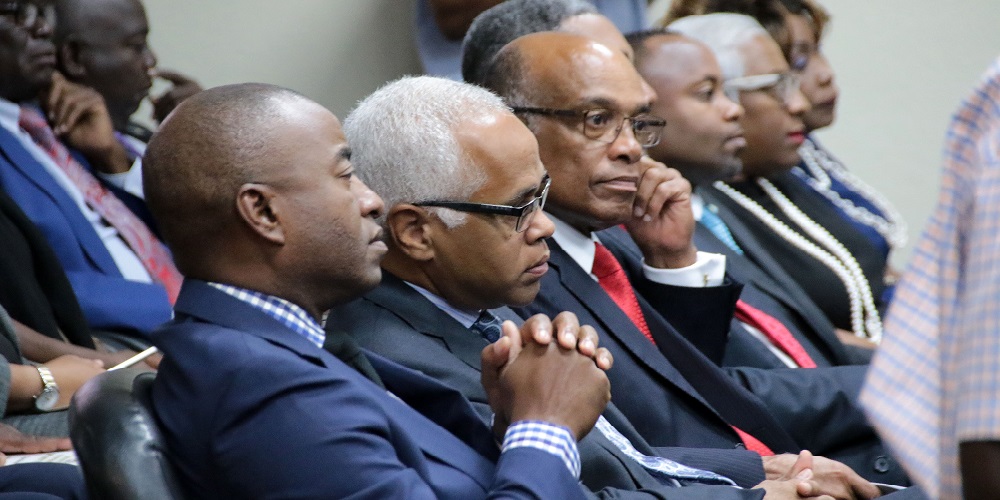 #Bahamas, April 25, 2018 – Nassau – The Freedom of Information Act (FOIA), 2017, will be brought into effect in phases in The Bahamas in order to ensure that all the preparatory work and training that is necessary to fully implement the regime, are in place.
#Bahamas, April 25, 2018 – Nassau – The Freedom of Information Act (FOIA), 2017, will be brought into effect in phases in The Bahamas in order to ensure that all the preparatory work and training that is necessary to fully implement the regime, are in place.
“This will better ensure the effectiveness of the regime,” Prime Minister, Dr. the Hon. Hubert A. Minnis said Monday (April 23, 2018).
Addressing the Opening Session of a Workshop on the Freedom of Information Act, 2017, hosted by the Office of the Attorney-General and Ministry of Legal Affairs at the Paul H. Farquharson Conference Centre, Police Headquarters, Prime Minister Minnis said freedom of information, or the right to access information, is considered “an essential component of a modern democracy.”
Monday’s workshop sessions were facilitated by Mr. Damian Cox, Chief Technical Officer in the Office of the Prime Minister, Jamaica, and Mr. Shane Miller, Assistant Director of Legal Affairs, Ministry of Legal Affairs, The Bahamas. Mr. Cox was involved in the implementation of Jamaica’s Access to Information Act, which is equivalent to the Bahamas’ Freedom of Information Act.

The workshop included an Outline/Overview of the Bahamas FOIA, facilitated by Assistant Director Miller and also focused on Critical Components of Successful Freedom of Information Implementation and Jamaica’s Access to Information Experience – Challenges, Successes and Opportunities, both facilitated by Chief Technical Officer Cox.
It was attended by Members of the Cabinet of The Bahamas, the Senate President, Speaker of the House of Assembly, Parliamentary Secretaries, the Vice-President of the Senate, Deputy Speaker of the House of Assembly, Members of the Senate and House of Assembly, Secretary to the  Cabinet, Financial Secretary, Senior Law Enforcement officials, Permanent Secretaries and other Senior Government Officials.
Cabinet, Financial Secretary, Senior Law Enforcement officials, Permanent Secretaries and other Senior Government Officials.
“Meaningful and productive” workshops with the public sector and civil society groups are scheduled to be held over the next several days.
“The Model Inter-American Law on Access to Public Information” states in its preamble that the Inter-American Court of Human Rights formally recognized the right of access to information as part of the fundamental rights to freedom of expression; that access to information is a fundamental right and an essential condition for all democratic societies and that the right of access to information is based on the principle of maximum disclosure.”
Prime Minister Minnis said the Act is intended to ensure general public access to government information.
The Prime Minister said there are a number of safeguards for the protection of an individual’s sensitive, personal data and that the Act further ensures the protection of national security matters, legal privilege and certain government communications.

“With the exception of these carve outs or exemptions, the Act provides the public wide access to records,” Prime Minister Minnis added.
The objectives of the Freedom of Information Act, 2017, as outlined in Section Four are to reinforce and give further effect to certain fundamental principles underlying the system of constitutional democracy, namely: governmental accountability; and transparency and public participation in national decision-making by granting to the public, a general right of access to records held by a public authority.
Access to records will be subject to exemptions that balance the right of access and non-disclosure of governmental or commercial information in the public interest.
“I am pleased that we are beginning the full training and implementation phase of the Freedom of Information regime,” Prime Minister Minnis said. “We look forward to meaningful and productive workshops with the public sector and civil society groups over the next several days.”
By: Matt Maura (BIS)
PHOTO CAPTIONS
221399
Prime Minister, Dr. the Hon. Hubert Minnis addresses the official opening of a Workshop on the Freedom of Information Act, 2017, hosted by the Office of the Attorney General and Ministry of Legal Affairs, at the Paul H. Farquharson Conference Centre, Police Headquarters, on April 23, 2018. (BIS Photo/Derek Smith)
221407
Members of the Cabinet. (BIS Photo/Derek Smith)
221432
National Security Leaders. (BIS Photo/Derek Smith)




 TCI News1 week ago
TCI News1 week ago
 Bahamas News6 days ago
Bahamas News6 days ago
 TCI News1 week ago
TCI News1 week ago
 TCI News1 week ago
TCI News1 week ago
 Bahamas News7 days ago
Bahamas News7 days ago
 Bahamas News6 days ago
Bahamas News6 days ago
 USA2 days ago
USA2 days ago
 Bahamas News6 days ago
Bahamas News6 days ago
















